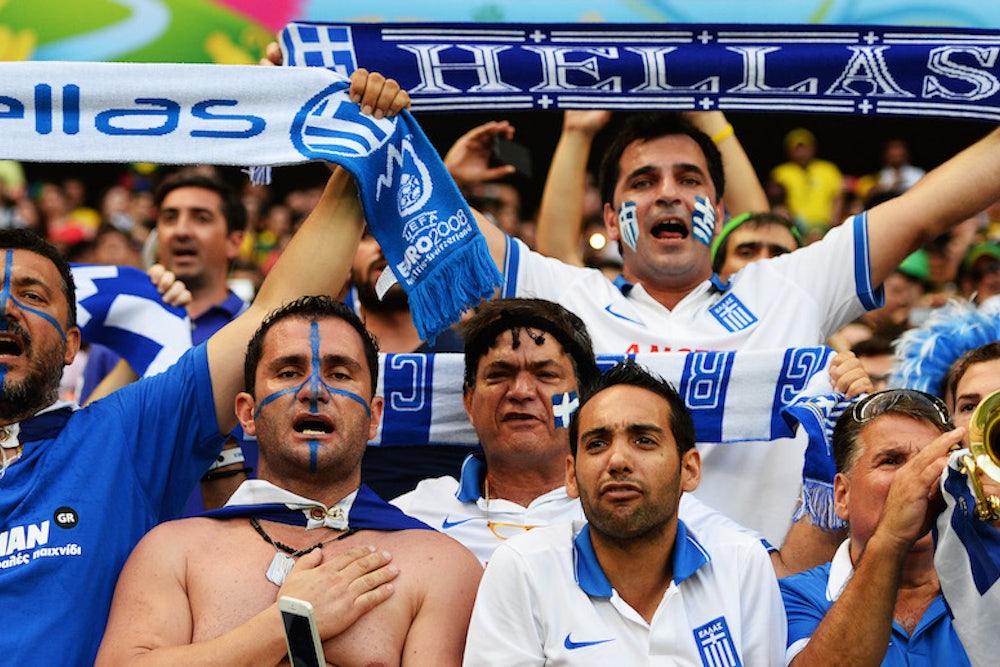Yesterday was a long day. After my morning workout, between noon and four, I took part in a private roundtable discussion on a new book concerning the origins and the handling of the Greek crisis. It is by economists Theodore Pelagidis and Michael Mitsopoulos, part of the European Growth project of the Brookings Institution, in collaboration with the Stavros Niarchos Foundation—really worth a read. Directly after that, there was the public launch of the book, which I covered for Kathimerini, the newspaper I work for. Then, around eight, those of us who took part in the private event were transported from the hotel to a restaurant with a splendid view of the Acropolis for dinner.
A few days earlier, I had realized that the dinner was on the same night as Greece’s deciding group stage game against the Ivory Coast. After the initial shock of the news wore off, I pulled myself together and was happy to discover that the match did not start until 11 at night local time. Speaking on Monday to one of the main organizers from Brookings, she confessed to a similar, fleeting sense of scheduling horror (of no Greeks showing up at the dinner).
Throughout the day, the game was on my mind and at the tip of my tongue. In order to go through, Greece needed to win—which entailed scoring, for the first time in this World Cup—and Japan needed not to. I exchanged learned views on this with taxi drivers, economists, executives from the Niarchos foundation, a Belgian colleague, and a German government official. My father chimed in at some point as well. Whenever I could steal a moment, I texted and emailed friends to arrange a strong viewing contingent for the big event.
Unlike in 2004, when, after a certain point, everyone thought we would win the Euro, yesterday I found most Greeks pessimistic about the prospect of making it to the last 16. Someone even offered to bet me that we would not only be eliminated, but would lose the match to boot. Partly, that had to do with the fact that we had not scored a single goal and were being berated the world over for our uber-defensive playing style (if you can call it a style). I couldn’t help but think, though, that it was also because of the toll of Greece’s Great Crisis. Six years of recession, with more than a quarter of the population unemployed and with GDP down by 25 percent from its pre-crisis high, is hardly conducive to an sunny outlook.
At the dinner, I made sure to explain to one of the waiters that strict deadlines that had to be met. He understood perfectly. A little after 10.30 p.m., dessert had been served but the conversation was still going strong. I was preparing to leave, taking a Greek-American friend with me, but I wondered: Are people really going to stick around? Is the game not uppermost on every Greek’s mind? Not more than five minutes later, I had my answer. The high talk of debt crises and growth strategies, labor market reform and banking union, was over in the blink of an eye. I have never seen such a lively dinner end so abruptly.
In less than a quarter of an hour, my friend and I got to the designated rooftop at the edge of Lykavittos hill in downtown Athens. There was nearly a dozen of us there, on a balmy pre-heat-wave night, overlooking the western suburbs and Mount Parnitha to the north. Relatively early in the first half, the team’s stars seemed once more to be misaligned. Coach Fernando Santos had to replace goalie Orestis Karnezis and attacking midfielder Panagiotis Kone, both of whom were injured. In the 33rd minute, a powerful strike by Jose Cholebas hit the crossbar.
But Greece’s efforts were rewarded less than ten minutes later, when Andreas Samaris, Kone’s replacement, intercepted a poor pass by an Ivory Coast defender and, after a quick one-two with Giorgos Samaras, beat the keeper with a solid finish. Our first 2014 World Cup goal led to delirium on the rooftop. My Greek-American friend felt his inner Greek emerge to the surface.
Before the end of the first half, we learned that Japan had tied the game against Colombia 1-1 in the group’s other match, which took place at the same time. Early in the second half, Colombia went ahead again. The feeling on the rooftop was one of increasing confidence. The Ivory Coast was putting pressure on us, but not very effectively, and Karagounis nearly doubled with another huge strike, which also rocked the crossbar. Japan, meanwhile, was two goals short of its target.
Then, in the 74th minute, disaster struck. Gervinho passed the ball to Wilfried Bony inside the box and he shot it past replacement keeper Panagiotis Glykos before the Greek defense could intervene. Still, we did not lose heart on the rooftop. The Ivory Coast still seemed beatable. The Greek team surged forward, pushed and prodded wherever it could. It wasn’t pretty, but in the end it was effective: in the second minute of stoppage time, Giorgos Samaras was brought down in the penalty area and the referee—perhaps a tad generously—pointed to the spot. Samaras, with nerves of steel and ice-cold blood and all the rest of it, sent the ball into the back of the net, and the rooftop once more exploded. Miraculously, none of us was hurt in the festivities. I believe a glass broke. Japan, meanwhile, went down in flames, losing 4-1.
On Sunday, the Greeks face Costa Rica for a place in the quarter-finals. On rooftops and balconies, in beach bars and tavernas across this long-suffering land, people will be glued to their TV sets. It probably won’t be the match of the tournament. But World Cup watchers by now should now that Greece cannot be easily put down.
